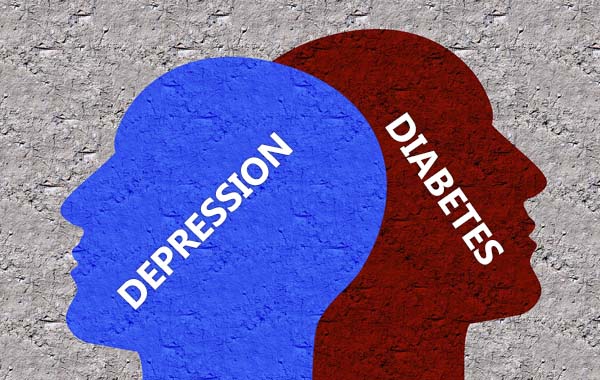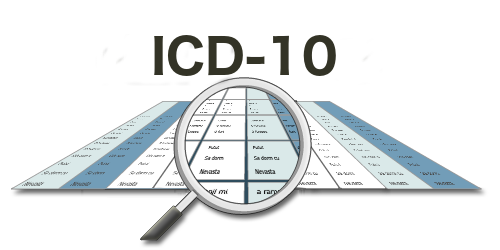
When you have diabetes, you are already dealing with a lot. Now add depression into the mix- you now have a double-whammy. This is what happens when you have diabetes- you are at increased risk for developing depression. So when you develop depression in addition to your diabetes, then this makes your diabetes worse. And the diabetes makes the depression worse. So what you get is a negative spiral, with out of control blood sugars, and ever increasing mood symptoms.
Therefore, it is imperative to take care of your depression, so that your diabetes treatment can be optimized, and not sabotaged by untreated depression.
Depression and Diabetes
When you have diabetes, then depression is sure to follow. For people with diabetes, the risk for depression is two to three times higher.1 The reason depression and diabetes go together is that they have similar causes. Both diabetes and depression are caused by poor diet, lack of exercise, poor sleep, and psychosocial stressors.
These factors cause diabetes and depression via the body’s stress response. So when you are dealing with high pressured stuff (like losing a job, financial difficulties, or relationship problems) or not taking care of your body (not eating properly, not sleeping, not exercising), then your body mounts a stress response.
This stress response releases stress hormones (such as cortisol and adrenaline) and activates the sympathetic nervous system, which decreases the ability of your own insulin to utilize blood sugars. In addition, the stress response dumps a lot of glucose into your bloodstream to fuel your stress response, as the body is preparing for fighting or fleeing (or freezing). With chronic activation of the stress response, high blood sugar and diabetes result.
This same stress response with the resultant release of stress hormones also has behavioral effects, as adrenaline and cortisol activate the fear circuit and hence trigger anxiety. In addition, these stress hormones overtax the reward system in the brain, leading to tachyphylaxis and produces depression.2 Cortisol also disrupts the generation of new neurons in the hippocampus, which is a part of the brain that also mediates depression and diabetes.3 Finally, the immune response is suppressed by the stress response, and this also can lead to both diabetes and depression.4,5 So the stress response is the common pathway for the development of diabetes and depression.
What we also see is that anxiety also goes along with diabetes, as anxiety is triggered by the same mechanism as depression and diabetes (via the stress response).
For more diabetes management articles read the following:
Symptoms of Depression
The symptoms of depression are easy to recognize if you use the following mnemonic: SIGECAPS.
SIGECAPS is used by many doctors to help them diagnose depression in their patients. But you can also use SIGECAPS to see if you also have depression, in addition to diabetes. If you have depression, you need to have either low moods or anhedonia (inability to feel pleasure). And in addition to low moods or anhedonia, you also need to have at least 4 more symptoms from SIGECAPS. Finally, you need to have these symptoms for most days of the week, for a period of at least 2 weeks, in order to meet the criteria for clinical depression, also known as major depressive disorder.
SIGECAPS stands for:
S- Sleep
- When you have depression, you have disrupted sleep patterns, including waking up multiple times in the early morning, having trouble falling asleep, or having problems staying asleep.
I- Interest
- Depression causes you to lose interest in things, where you once found pleasure.
G- Guilt
- Depression induces feeling of guilt and hopelessness. You feel guilty about everything, and all seems hopeless.
E- Energy
- Depression causes you to have low energy; you are easily fatigued. And having poor sleep and poor appetite that go along with depression further taxes your energy level.
C- Concentration
- When you have depression, you have poor concentration and are not able to focus on tasks. That is why it is best to not make important decisions in your life until your depression is treated.
A- Appetite
- Depression causes your appetite to change- either you decrease your eating, or you increase your eating. With these appetite changes, there are also weight changes.
P- Psychomotor
- When you have depression, you have changes in your movements with your body. Either you become restless and agitated (psychomotor agitation) or you become docile and listless (psychomotor retardation).
S- Suicide
- Unfortunately, when you have depression and hopelessness, then you may also have suicidal ideations. If you have suicidal ideations, it is important to get help right away, and contact your doctor.
Treating Depression
When you have both depression and diabetes, it is imperative to treat both disorders, as inadequate treatment of one will lead to more negative consequences for the other. But if you have to focus on one to start first, then it is recommended that your depression treatment start first, as treatment for depression can respond in a few weeks, whereas treating diabetes shows up as better glycemic control a few months later. But the important thing is to first identify depression on top of diabetes, then to commence treatment for depression, then treat the diabetes.
Depression is treated with psychotherapy.
And the type of psychotherapy you choose is based on your preferences. If you want to find the root cause of your depression, then insight-oriented psychotherapy is for you. If you just want practical methods to eradicate depression, then CBT (cognitive behavioral therapy) may be for you. If you do not respond to psychotherapy, or if your depression is too severe, then you may need to consider antidepressant medication treatment.
However, antidepressant medications may be associated with an increase in HbA1C, the main indicator of glycemic control in diabetics. So antidepressant use may lead to suboptimal blood sugar control in diabetics.6 However, SSRIs (Selective Serotonin Reuptake Inhibitors) seem to have the most favorable glycemic control profile and is generally well-tolerated in diabetics.7
Summary
It is important for diabetics to look for symptoms of depression, as depression in diabetics often goes unnoticed, and hence untreated. Sadly, depression goes hand-in-hand with diabetes, given they have similar causes. And untreated depression has negative impact on the diabetes and the diabetes treatment, with worse glycemic control and suboptimal response to treatment.
Therefore, diabetics and their doctors should be on the lookout for any development of depression, as aided by the mnemonic SIGECAPS. But if you have suicidal ideations, please visit with your doctor immediately, or go to the emergency department for an urgent assessment.
Further reading:
Dr. Carlo Carandang, MD, is a psychiatrist and blogger Dr. Carlo is a Fellow with the American Psychiatric Association, and has a medical license from Washington State. Dr. Carlo has treated thousands of patients with anxiety and depression, and has focused his research, clinical expertise, and teaching on improving diagnosis and treatment for anxiety and depression.
TheDiabetesCouncil Article | Reviewed by Dr. Christine Traxler MD on June 10, 2020
References
- Epidemiology of depression and diabetes: a systematic review. Roy T, Lloyd CE. J Affect Disord. 2012 Oct; 142 Suppl():S8-21.
- Stress and disorders of the stress system. Chrousos GP. Nat Rev Endocrinol. 2009 Jul; 5(7):374-81.
- Do corticosteroids damage the brain? Herbert J, Goodyer IM, Grossman AB, Hastings MH, de Kloet ER, Lightman SL, Lupien SJ, Roozendaal B, Seckl JR. J Neuroendocrinol. 2006 Jun; 18(6):393-411.
- Inflammatory markers and risk of type 2 diabetes: a systematic review and meta-analysis. Wang X, Bao W, Liu J, Ouyang YY, Wang D, Rong S, Xiao X, Shan ZL, Zhang Y, Yao P, Liu LG. Diabetes Care. 2013 Jan; 36(1):166-75.
- Cytokines sing the blues: inflammation and the pathogenesis of depression. Raison CL, Capuron L, Miller AH. Trends Immunol. 2006 Jan; 27(1):24-31.
- The association between antidepressant use and glycemic control in the Southern Community Cohort Study (SCCS). Kammer JR, Hosler AS, Leckman-Westin E, DiRienzo G, Osborn CY. J Diabetes Complications. 2015.
- Effects of antidepressants on glucose metabolism and diabetes mellitus type 2 in adults. Deuschle M. Curr Opin Psychiatry. 2013 Jan; 26(1):60-5.







